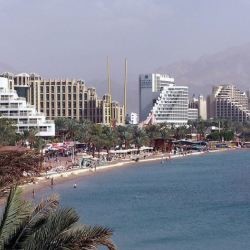Israel Casino Expansion Starting To Look Less Likely

While countries as diverse as Brazil and Pakistan are seriously considering loosening their gambling laws, Israel continues to maintain the status quo, greatly restricting the right to gamble within its borders. Under the current law, there are only two forms of gambling that are legally available in the country of 8 million people, namely the Mifal Hapayis and the Toto. In the meantime, if Prime Minister Benjamin Netanyahu has his way a number of land-based casinos would also be allowed to open for business, especially in the sea resort city of Eilat.
Mifal Hapayis
Mifal Hapayis is the official state run lottery of Israel and was founded in 1951. Originally, the lottery was established in order to generate funds to build a hospital in Tel Aviv when the then-new nation had very little by way of extra revenue to support such projects.
Today, employees are paid nearly 2.5 times the annual wage in the country, and the lottery runs on a $1.67 billion budget generated from gambling revenues, with about 60 percent reportedly going to winners. Some of the revenue are used to pay for projects like the construction of schools, and communities can also apply to receive funds, although there has been criticism over the fact that even richer communities can receive money from Mifal Hapayis.
The Israeli lottery offers a number of ways to play. There is a weekly drawing, and scratch-off tickets are sold, while, electronic booths allow Israeli residents to play nine different games at locations across Israel. The lottery also has an at-home subscription program that allows people to enter for monthly drawings.
The Toto
Toto was created in 1967 and is a legal state-sponsored form of sports betting. The programs generates about $2.6 billion in revenues per year, and like the lottery, it donates some of its proceeds. Unlike the lottery that pays for municipal projects, though, the Toto funds public causes, many of which are sports related. The National Sports Council is responsible for distributing the funds, which are split between competitive sports, Olympic sports, youth sports programs, women’s sports, sports programs for people with disabilities and the construction of sports facilities.
Around 75% of those people who place wagers through the Toto are betting on soccer, followed by basketball, and then a number of other sports. There is also a wing of the Toto for horse-racing called Totoís Racer. Launched in 2014, Totoís Racer allows Israelis to bet on horse races that are taking place in Ireland and England, and provides instant payouts to winners.
Is a Gambling Industry Still Desirable?
While Mifal Hapayis and the Toto are both profitable, critics wonder if they are still necessary. Israel now has a thriving economy, and some people speculate that projects that the state-sponsored gambling money goes to could easily now be funded through other means. Those against the lottery and the sports betting programs argue that gambling does more harm than good because of the risk of addiction.
Economics versus Ethics
After winning the 2015 general election, Prime Minister Benjamin Netanyahu ordered an exploratory casino gambing report to be produced by two members of his Likud party, namely the Tourism Minister Yariv Levin, and the Transportation Minister Israel Katz. Netanyahu said he was considering allowing two to four casinos to be built in Eilat “in order to save Eilat from economic collapse and to create thousands of jobs in the city.”
Major objections against a gambling expansion, however, have been put forward by religious parties, such as Bayit Yehudi, United Torah Judaism and Shas, which have argued that a gambling expansion would instead cause social problems in the country, including gambling addiction, and a disruption to family cohesion. Elaborating on the divisive issue, Education Minister Naftali Bennett said:
“It is forbidden morally because casinos contradict the values of our state, serve the strong and weaken the weak, and practically because we will all need to fund the damage and injury to the body and soul that will come along with a casino. Israel isn’t Vegas and it won’t be. We will oppose it.”
As a result of objections such as these being aired by numerous member of the ruling coalition, it seems unlikely that Israel will move toward looser gambling laws anytime soon.










